‘Basically a milkshake’: debunking the cult of protein powder
In a consumer quest for ever-higher protein intakes, protein powder has become a huge industry. But is it really giving the body what it needs?
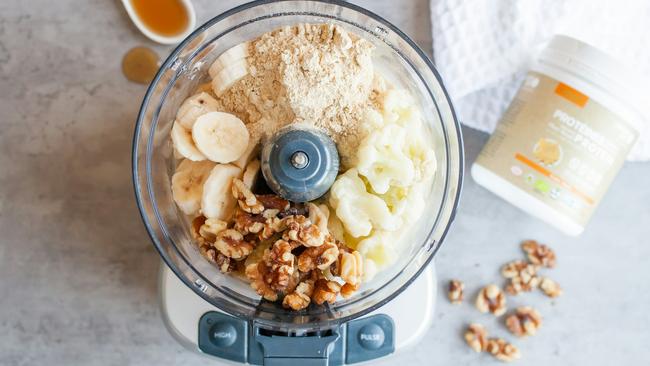
Protein is all the rage. Protein powders, high-protein yoghurts, even protein water – people are consuming the stuff like never before. Whey and pea protein powders are now a huge industry, and anyone who has purchased a tub of it will know it isn’t cheap. But is this dietary supplementation with what is essentially a processed food really the best way to get your protein? And how much protein do you need anyway?
How much protein should I really be eating?
On the one hand, the official Australian Guide to Healthy Eating specifies that adult women should aim for 0.75 grams of protein per kilogram of body weight per day. For a woman of an average weight of 65kg, that would be about 49g of protein a day – easily doable when the average serve of chicken gives you about 30g. Pregnant women need more, and those aged over 70 are advised to eat 1g of protein per kilogram of body weight.
For adult men, the advice is 0.84g per kilogram of body weight a day, and more for those over the age of 70.
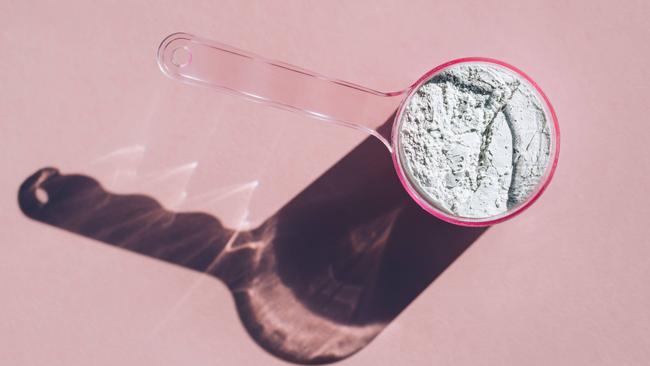
Read any fitness forum, however, and you'll see radically different figures being espoused. It’s common in these sources to see women who lift weights eating as much as 130g of protein a day or even more. There are many fitness gurus especially targeting women in menopause who also advise much higher protein consumption along with strength training.
They may have a point, especially for people looking to gain muscle through strength training and to reduce body fat, according to leading Australian dietitian Jemma O’Hanlon.
“The amount of protein consumed in a day is important for muscle gain,” O’Hanlon says. “The American College of Sports Medicine advises that, in combination with resistance training, 1.2–1.7g protein per kilogram per day is recommended to increase muscle mass.”
So is it time to hit the protein shakes?
Protein powders are extractions usually of whey or types of peas and are an isolated form of the macronutrient, most often with additives and sweeteners. A standard scoop of protein powder in a smoothie commonly delivers about 20g of protein. But here’s the thing – the way the body uses this protein isolate supplement is different to the way the body metabolises protein from wholefoods. First up, it’s processed more quickly by the body, so doesn’t keep you feeling full for as long, which is one of the major benefits of eating a reasonable amount of wholefood protein if you’re looking to lose weight.
According to the peak body Dietitians Australia, the complex combination of amino acids and other nutrients such as vitamins, minerals, and fibre in wholefood protein sources may be important for promoting a process called long-term myofibrillar protein synthesis. Muscle protein synthesis is essential for training-induced muscle hypertrophy, which occurs when tiny tears in the muscles that occur when strength training are repaired by the body, promoting muscle growth. Protein isolates from powdered products rapidly stimulate protein synthesis,
but only for a short period of time. Whole food protein sources digest slower and result in
much longer increases in muscle protein synthesis compared to whey protein. Muscle protein synthesis is also highly dependant on the availability of essential amino acids. Supplemental amino acids from protein powders are not as effective in producing muscle protein synthesis as they are not sustained in the body for long enough and are therefore not as effective in producing long-term muscle gains.
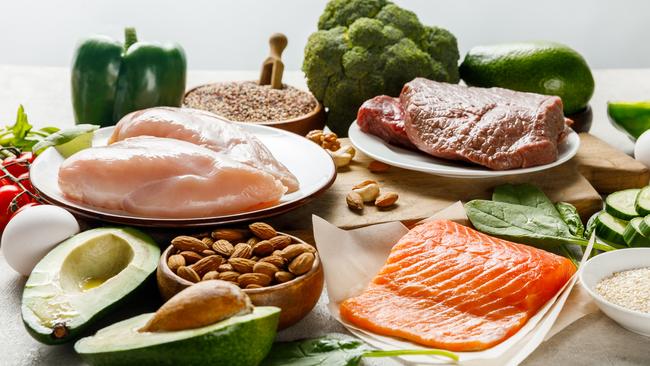
“We need to prioritise protein from whole foods like legumes (beans, lentils), nuts, milk, yoghurt, cheese, eggs, fish and chicken – these foods offer protein in their most natural form, which is far superior to an ultra-processed protein powder,” says O’Hanlon.
“The food matrix is a term to describe the benefits of eating foods based on their unique structure, nutritional components and how they interact. This means there’s benefits in the way our bodies digest, absorb and metabolise these foods compared to foods that have already undergone significant processing. By eating the whole food, we’ll not only reap the benefits of protein but a range of naturally occurring vitamins, minerals and bioactives found in these foods, so the benefits are enormous.”
So is protein powder an expensive gimmick?
“Protein powders are a milkshake basically,” says Fiona Willer, president of Dietitians Australia.
“With my dietitian’s hat on, it can be a vehicle for people eating fruits if they put them into their protein shakes. But if it’s just the powder, made on a base of water or milk or non-dairy milk alternative, it’s a milkshake.
“These products are expensive and it’s a really aggressive market. But it’s really only athletes and people with very physically strenuous occupations with nutrient needs that are different from the rest of the population that may need these supplements. The rest of us regular humans, even those who are quite fit, are unlikely to need any of these protein powder supplements.”
O’Hanlon agrees.
“Protein has become more of an obsession than it needs to be, which is evident when you walk down the aisles of a supermarket and see protein claims everywhere,” she says.
“Most Australians don’t have any issues meeting their protein requirements. In general, we don’t need protein powders or protein supplements. The best thing to do is focus on enjoying a balanced eating pattern like the Mediterranean diet, which is rich in whole protein foods like nuts, legumes and fish, as well as so many other important food groups, like vegetables, which Australians are significantly lacking in.”
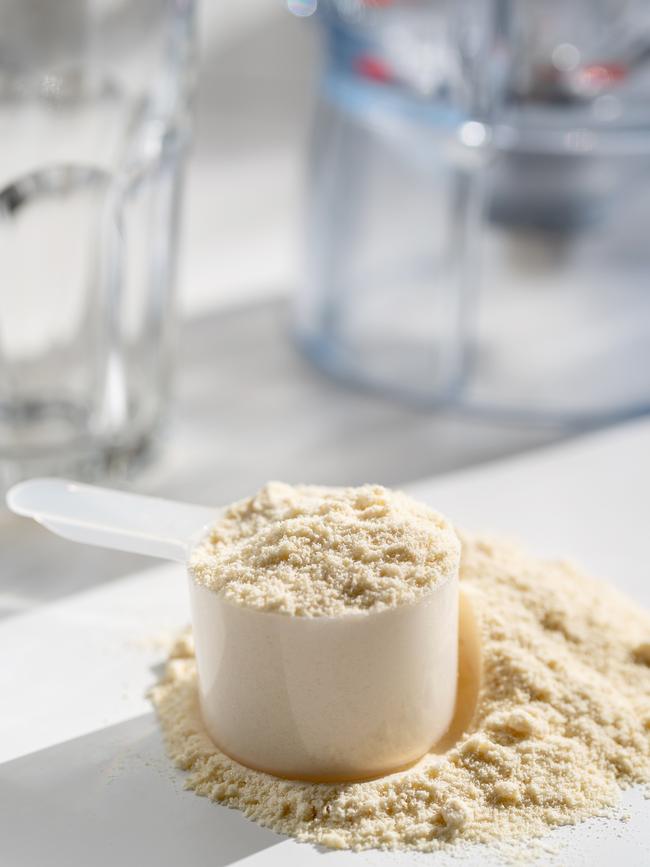
But if you really want to go the easy route and hit the protein powder, here’s a little secret...
It’s a little-known fact that a common supermarket staple provides almost exactly the same benefits as expensive protein powders at a fraction of the cost. That product is garden variety milk powder.
Just like many expensive protein powders, milk power is an isolated form of whey and casein proteins, and contains essential amino acids. It also contains additional nutrients, including calcium, vitamin D, and electrolytes. The proteins in milk powder are both fast-digesting whey protein and slow-digesting casein protein, which sustains amino acid delivery over time. This budget hack protein powder won’t give you that sweet hit of the fitness industry products, but it will sure leave you with cash in your pocket for your gym membership.


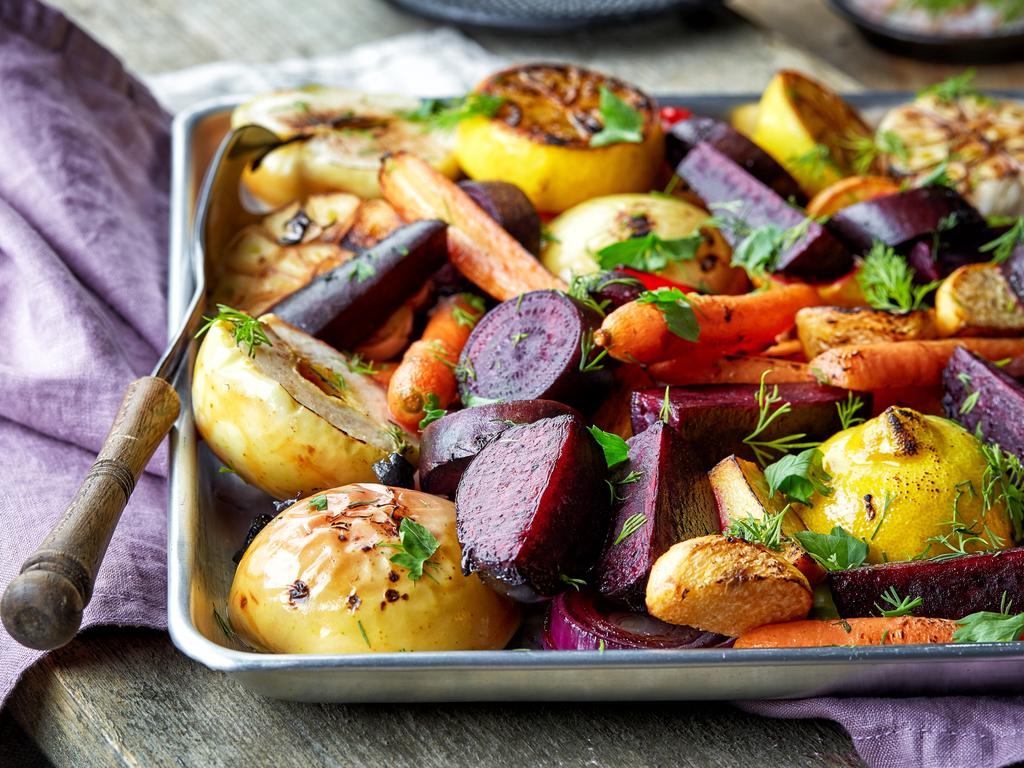


To join the conversation, please log in. Don't have an account? Register
Join the conversation, you are commenting as Logout